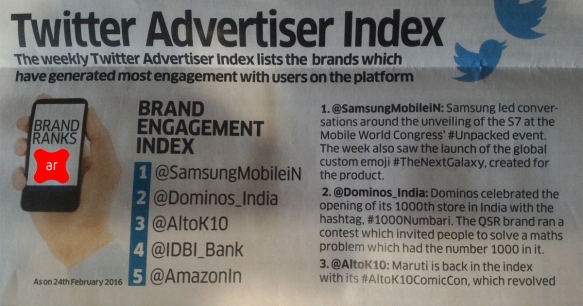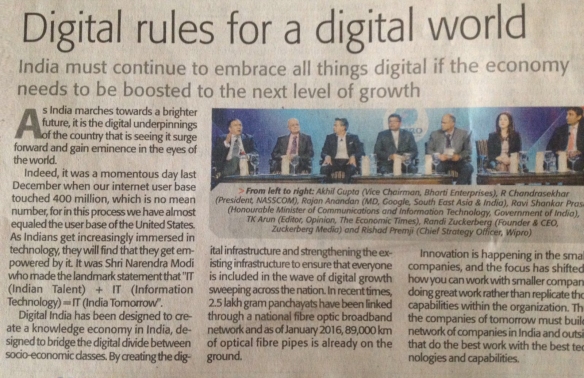SEO (Search Engine Optimization) Marketing is one of today’s most needed tool to conquer digital gambit.
Some important facts about Searches made in 2016 : –
72% of consumers who did a local search visited a store within five miles. (Source: WordStream, 2016)
62% of B2B marketers and 51% of B2C marketers have optimized their blogs for mobile in order to improve SEO. (Source: Social Media Examiner, 2016)
Google accounts for over 76% of all global desktop search traffic, followed by Bing at 8%, Baidu at 7.5% and Yahoo at 7%. (Source: NetMarketShare, 2016)
75% percent of internet use will be mobile in 2017, up from 71% this year. (Source: Reuters, 2016)
Google “near me” searches have increased by two times over the past year. (Source: Search Engine Watch, 2016)
81% of surveyed marketers have integrated social media marketing with traditional marketing to increase discoverability of their website. (Source: Social Media Examiner, 2016)
Search engine optimization has proven to be a successful marketing strategy for countless businesses over the years. However, to reap the benefits of search traffic you need to invest in your business just like you would any other marketing strategy.
SEO Marketing Definition:
SEO marketing, referred as “Search Engine Optimization” is basically the method to increase visibility of a website on search engine results pages. Eg. If some one searches “ Best Tour operators in Ahmedabad” Your company should be there on first page for customer to click on and get details . If you are there on second or third page, which makes no sense as people these days don’t have that much time to scroll on . The main tendency is to click the first five – six sites, and go further . So SEO exercise is to get you “IN” to that first page spots .
To attain this there are many factors that need to be taken into consideration as a part of your SEO strategy which considers more than just keywords.
Considerations of how search engines work, which search engines are being used by your target audience, and what your customers are searching for. The goal is to improve the relevance of your website so that it is indexed and well positioned by the search engines.
Search engine optimization is about more than having a lot of content. It also includes if your website is well structured and can affect the development and design. It’s about making sure that you not only have content, but that it’s the right content.
Search engines take the quality of content and the structure of a website into consideration when “ranking” a website.
SEO marketing isn’t something you do once and then you are done. The playing field is constantly changing as the search engines refine the way they work. The goal of a search engine is to deliver the most relevant results possible to the searcher.
Is SEO Marketing Important for you:
Nine out of ten people use the internet to shop or to find details about products / services even if they don’t want to shop.
The number one starting point is search. Gone are the days of bookmarks and customer loyalty. Today’s consumer is in charge. They know what they’re looking for and they know how to find it.
If your company website isn’t on the first page of results it’s practically invisible.
- 97% of people in US uses internet for online shopping.
- Organic search results are a compliment to a paid search campaign
- Improve search engine position
- Drive qualified traffic to your site
- Increase conversion
- Reduce Bounce Rate
- Engage Customers
- Be recognized as an authority in your niche
- Promote your local business
My Business is Local – Is SEO Marketing Still Important?
According to Google’s research, 90% of internet users use search to find local businesses.
People used to use the Yellow Pages to find local businesses – today they use the internet. Every business should have a website and every business owner should have a basic understanding of how search engines work and have a marketing plan in place.
- 74% of online users perform local searches (Kelsey Group)
I Have a Website — Why Hire an SEO Consultant?
Hiring a good SEO consultant will more than pay for itself. They thrive on staying on top of the latest changes in the search engine and their job is to help you implement a strategy that will help you attract customers and grow your business.
An SEO expert will deliver an objective review of your websites strengths and weakness. They will help you develop a strategy to make improvements that will result in better search engine placement.
Whether you’re a sole proprietor of your own business or are in charge of your company’s internet marketing department, you don’t have time to keep up on the constantly changing playing field.
Hiring a qualified professional lets you focus on what you do best.
- Fresh perspective – objective point of view
- Current knowledge of SEO Marketing strategies
- Knows the “Do’s and Don’ts” of SEO
- Keyword research
- Competitive Analysis
- Content development
Don’t be fooled by agencies who “guarantee” top rankings in search results and put their focus only on keywords.
- Improve search engine position
- Drive qualified traffic to your site
- Increase conversion
- Reduce Bounce Rate
- Engage Customers
- Be recognized as an authority in your niche
Promote your local business
Remember to keep your SEO agile and flexible in 2017, as Google is continuously updating and re-ranking its algorithm based on what users value.
AR Digital media is on of the Best SEO Company n Ahmadabad, Gujarat India



 Earlier this week, Mark Zuckerberg’s Twitter and Pinterest accounts were hacked with a person familiar with the matter claiming he reused the password: “dadada”.
Earlier this week, Mark Zuckerberg’s Twitter and Pinterest accounts were hacked with a person familiar with the matter claiming he reused the password: “dadada”.






